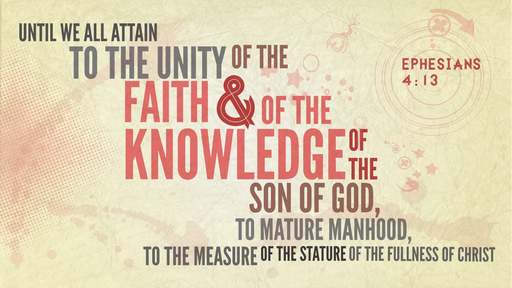Part 2: Overcoming Conflict

Notes
Transcript
1. Living in a Divided World
1. Living in a Divided World
Part 1: United in Christ
Scripture: Ephesians 4:1-6
Focus: Emphasize the importance of unity within the body of Christ despite differing backgrounds and opinions.
Overcoming Conflict
Overcoming Conflict
Scripture: Matthew 5:9; Romans 12:18
Opening Prayer:
Heavenly Father, we come before You today seeking Your wisdom and guidance as we explore the topic of overcoming conflict. Open our hearts and minds to Your Word, and help us to understand how we can be peacemakers and live in harmony with others. In Jesus' name, we pray. Amen.
Introduction:
Good morning, church. Today, we continue our sermon series titled "Living in a Divided World" with part two, "Overcoming Conflict." Conflict is an inevitable part of life, whether in our personal relationships, workplaces, communities, or even within the church.
The Bible offers profound wisdom on how to handle conflict in a way that honors God and promotes peace.
Scripture Reading:
Let's begin by reading our key scriptures for today.
9 Blessed are the peacemakers, For they shall be called sons of God.
18 If it is possible, as much as depends on you, live peaceably with all men.
1. Understanding the Role of a Peacemaker:
1. Understanding the Role of a Peacemaker:
In Matthew 5:9, Jesus calls us to be peacemakers, promising that those who make peace will be called children of God. Being a peacemaker goes beyond avoiding conflict; it involves actively seeking to resolve it and promote harmony.
Illustration: Think about Abraham and Lot in Genesis 13. When their herders quarreled over land, Abraham took the initiative to resolve the conflict. He gave Lot the first choice of land, prioritizing peace over his own rights. This act of humility and generosity is a perfect example of peacemaking.
2. Living at Peace with Everyone:
2. Living at Peace with Everyone:
Romans 12:18 emphasizes the importance of living at peace with everyone, as far as it depends on us. This means making every effort to foster peace, even when it is difficult.
Example: David and Saul had a tumultuous relationship, with Saul repeatedly trying to kill David out of jealousy. Despite this, David refused to harm Saul when he had the chance, choosing instead to trust God and seek peace (1 Samuel 24). David's restraint and respect for Saul's position as the Lord's anointed exemplify living at peace.
3. Practical Steps to Overcome Conflict:
3. Practical Steps to Overcome Conflict:
Overcoming conflict requires practical steps grounded in biblical principles. Here are some key steps:
Seek Understanding:
Seek Understanding:
James 1:19 advises us to be quick to listen, slow to speak, and slow to become angry. Listening to understand the other person's perspective can diffuse tension and open the door to resolution.
Illustration: Jesus often listened to people's concerns and questions before responding. For instance, in John 4, He engaged with the Samaritan woman at the well, listening to her and addressing her concerns before revealing His identity as the Messiah.
Forgive and Let Go:
Forgive and Let Go:
Ephesians 4:31-32 urges us to get rid of bitterness, rage, and anger, and instead be kind and compassionate, forgiving each other just as in Christ God forgave us. Forgiveness is essential in overcoming conflict.
Example: Joseph forgave his brothers who sold him into slavery (Genesis 50:15-21). Despite the immense harm they caused him, Joseph chose to forgive and reconcile, seeing God's greater purpose in his suffering.
Speak the Truth in Love:
Speak the Truth in Love:
Ephesians 4:15 encourages us to speak the truth in love. Addressing issues honestly but with kindness can help resolve conflicts without causing further harm.
Illustration: Jesus modeled this when He corrected Peter in love (Matthew 16:21-23). He rebuked Peter for his wrong perspective but continued to love and disciple him.
4. The Heart of a Peacemaker:
4. The Heart of a Peacemaker:
To be effective peacemakers, our hearts must align with God's heart. This involves humility, compassion, and a genuine desire for reconciliation.
Illustration: The parable of the prodigal son (Luke 15:11-32) showcases the heart of a peacemaker. The father not only forgave his wayward son but also went out to reconcile with his older son, demonstrating unconditional love and a desire for family unity.
5. Trusting God in the Process:
5. Trusting God in the Process:
Overcoming conflict often requires patience and trust in God's timing and methods. We may not see immediate results, but we can trust that God is at work.
Example: Nehemiah faced opposition while rebuilding the walls of Jerusalem, but he trusted God and remained focused on the task (Nehemiah 4). His faith and perseverance eventually led to success and the restoration of the city.
Conclusion:
Overcoming conflict is a crucial part of our calling as Christians. By being peacemakers, seeking to live at peace with everyone, and applying practical biblical principles, we can navigate conflicts in a way that honors God and promotes harmony. Let us strive to be known as children of God, marked by our commitment to peace and reconciliation.
Closing Prayer:
Lord, thank You for Your Word and the guidance it provides. Help us to be peacemakers and to live at peace with everyone. Give us the wisdom and courage to overcome conflicts in a way that reflects Your love and grace. May our actions bring glory to Your name and draw others closer to You. In Jesus' name, we pray. Amen.
